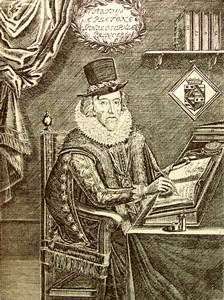Francis Bacon and the scientific method
"I have taken all knowledge to be my province" (from a letter to Lord Burleigh, 1592). Bacon's ambition was not merely to master all knowledge, but to reform it, especially the way by which new knowledge was to be acquired.
The method was to be inductive and experimental, amassing data on important subjects, classifying them, and developing from them wider rules and hypotheses. Like Paracelsus, Bacon rejected the old Aristotelian learning still taught in the Universities, and proposed a new method, a new logic, in his Novum Organum.
Bacon was not himself a distinguished scientist, though he dabbled in experiment; his importance is in the way he articulated what was to become the dominant mode of thought.
Discovering truth
Bacon eloquently argued that deductive reasoning should be replaced by inductive (scientific) reasoning:
There are and can be only two ways of searching into and discovering truth. The one flies from the senses and particulars to the most general axioms, and from these principles, the truth of which it takes for settled and immovable, proceeds to judgment and middle axioms. And this way is now in fashion. The other derives axioms from the senses and particulars, rising by a gradual and unbroken ascent, so that it arrives at the most general axioms last of all. This is the true way, but as yet untried.
(The New Organon, aphorism 19)
A web site devoted to Francis Bacon.
Footnotes
-
A scientific Utopia
The New Atlantis is a fictional work, describing an ideal society where knowledge is pursued in the way Bacon espoused as ideal. The most important part of the utopia he describes is Salomon's House, where all natural phenomena are examined and categorized. One of the Fathers of the house explains: "The end of our Foundation is the knowledge of causes and secret motions of things, and the enlarging of the bounds of Human Empire, to the effecting of all things possible."
The creation of the Royal Society in 1660 was in significant measure the result of Bacon's writings.
